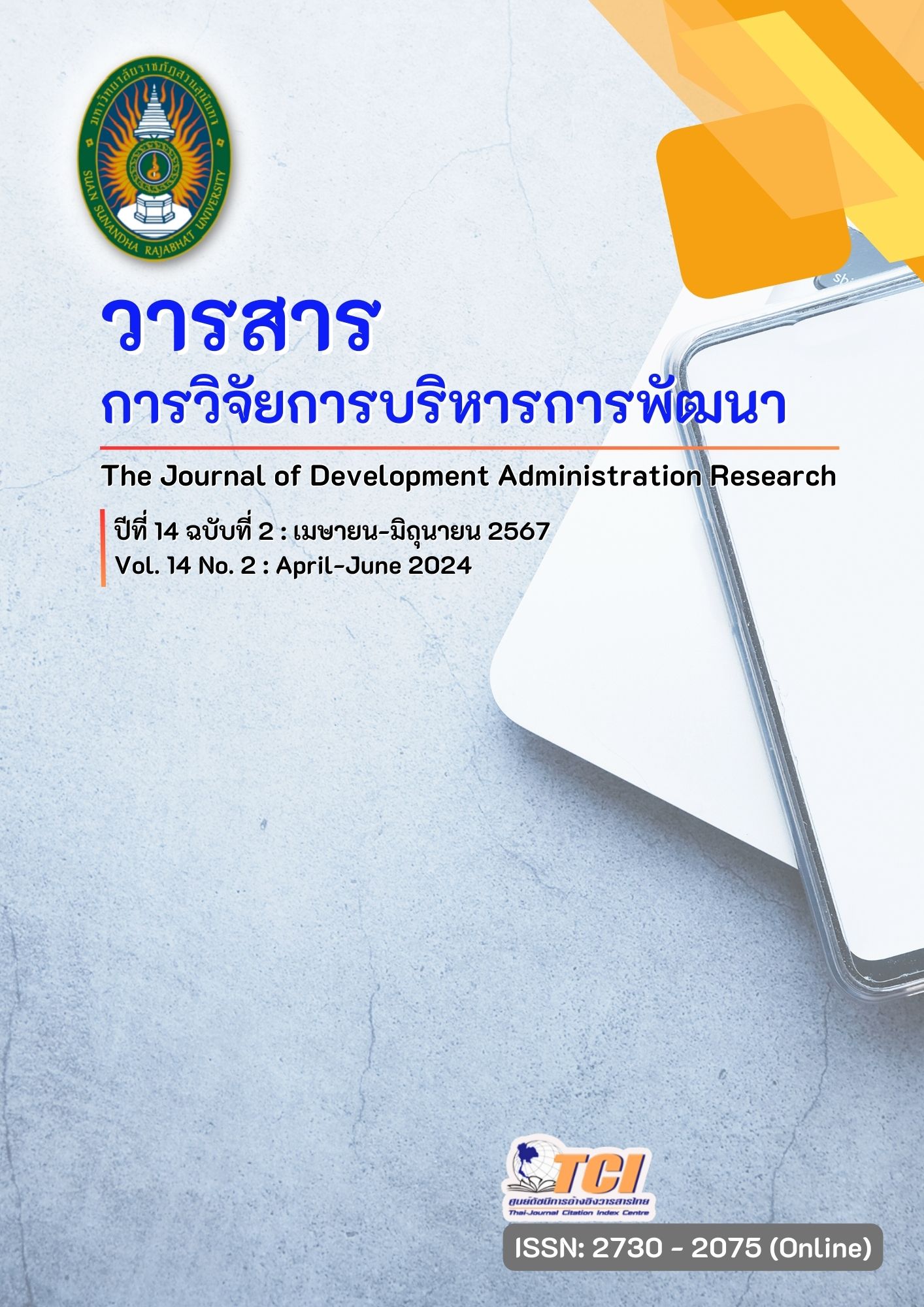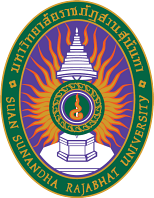ตัวแบบจำลองภาวะผู้นำการเปลี่ยนแปลง สมรรถนะการปฏิบัติงานและแรงจูงใจส่งผลต่อประสิทธิภาพในการปฏิบัติงานของพนักงานบริษัทประกันชีวิตในประเทศไทย
คำสำคัญ:
ภาวะผู้นำการเปลี่ยนแปลง, สมรรถนะในการปฏิบัติงาน, แรงจูงใจ, ประสิทธิภาพในการปฏิบัติงานบทคัดย่อ
การวิจัยนี้มีวัตถุประสงค์เพื่อ 1) ศึกษาระดับภาวะผู้นำการเปลี่ยนแปลง สมรรถนะในการปฏิบัติงาน แรงจูงใจ และประสิทธิภาพในการปฏิบัติงานของพนักงานบริษัทประกันชีวิตในประเทศไทย 2) ศึกษาปัจจัย
เชิงสาเหตุของ ภาวะผู้นำการเปลี่ยนแปลง สมรรถนะในการปฏิบัติงาน และแรงจูงใจที่ส่งผลต่อประสิทธิภาพในการปฏิบัติงานของพนักงานบริษัทประกันชีวิตในประเทศไทย และ 3) นำเสนอแบบจำลองของประสิทธิภาพในการปฏิบัติงานของพนักงานบริษัทประกันชีวิตในประเทศไทยกับข้อมูลเชิงประจักษ์ การวิจัยครั้งนี้เป็นการวิจัยแบบผสมผสาน การวิจัยเชิงปริมาณมีกลุ่มตัวอย่างคือ พนักงานบริษัทประกันชีวิตในประเทศไทย จำนวน 300 ตัวอย่าง สุ่มกลุ่มตัวอย่างแบบแบ่งชั้น ใช้แบบสอบถามในการเก็บรวบรวมข้อมูล วิเคราะห์ข้อมูลด้วยแบบจำลองสมการโครงสร้าง สำหรับการวิจัยเชิงคุณภาพ เก็บรวบรวมข้อมูลด้วยการสัมภาษณ์เจาะลึก ประกอบด้วย พนักงาน ผู้บริหาร กรรมการสมาคมประกันชีวิตไทย และนักวิชาการหรือผู้เชี่ยวชาญ รวมทั้งสิ้น 9 คนและวิเคราะห์ข้อมูลด้วยการวิเคราะห์เนื้อหา
ผลการวิจัยพบว่า 1) ภาวะผู้นำการเปลี่ยนแปลง สมรรถนะในการปฏิบัติงาน และแรงจูงใจและประสิทธิภาพในการปฏิบัติงานของพนักงานบริษัทประกันชีวิตในประเทศไทย มีความสำคัญอยู่ระดับมาก
2) สมรรถนะในการปฏิบัติงานมีอิทธิพลเชิงสาเหตุรวมต่อประสิทธิภาพในการปฏิบัติงานของพนักงานบริษัทประกันชีวิตในประเทศไทย มากที่สุด รองลงมาได้แก่ ภาวะผู้นำการเปลี่ยนแปลง และแรงจูงใจ
3) ได้แบบจำลองของประสิทธิภาพในการปฏิบัติงานของพนักงานบริษัทประกันชีวิตในประเทศไทยโดยแบบจำลองมีลักษณะดังแผนภูมิภาพประกอบด้วย สมรรถนะในการปฏิบัติงาน ที่มีค่าอิทธิพลรวมมากที่สุดรองลงมาคือ ภาวะผู้นำการเปลี่ยนแปลง และแรงจูงใจมีอิทธิพลต่อประสิทธิภาพในการปฏิบัติงานของพนักงานบริษัทประกันชีวิตในประเทศไทยที่มุ่งเน้นสู่ประสิทธิผลของงาน คุณภาพของงาน และความสามารถเกี่ยวกับงาน ทั้งนี้จากนั้นการพิจารณาค่าสัมประสิทธิเส้นทางของตัวแปรที่มีอิทธิพลต่อประสิทธิภาพในการปฏิบัติงานของพนักงานบริษัทประกันชีวิตในประเทศไทย ผู้วิจัยจึงสร้างสร้างโมเดลใหม่ ที่พัฒนาขึ้นคือ “แบบจำลองสมรรถนะในการปฏิบัติงาน ภาวะผู้นำการเปลี่ยนแปลง และแรงจูงใจประสิทธิภาพในการปฏิบัติงานของพนักงานบริษัทประกันชีวิตในประเทศไทย”
เอกสารอ้างอิง
พิรินทร์ชา สมานสินธุ์. (2554). ปัจจัยที่มีอิทธิพลต่อการสร้างความผูกพันของพนักงาน ศึกษาเฉพาะกรณี บริษัท เบสท์เพอฟอร์แมนซ์เอ็นจิเนียริ่ง จำกัด (วิทยานิพนธ์บริหารธุรกิจมหาบัณฑิต). มหาวิทยาลัยหอการค้าไทย.
พรชัย เจดามาน. (2556). การพัฒนาทรัพยากรมนุษย์. กรุงเทพฯ: สมาคมส่งเสริมเทคโนโลยี (ไทย-ญี่ปุ่น).
สุภาว์ อาวสกุลสุทธิ. (2552). รูปแบบการพัฒนาคุณลักษณะภาวะผู้นำของหัวหน้างานการพยาบาล โรงพยาบาลชุมชน (วิทยานิพน์ปรัชญาดุษฎีบัณฑิต). มหาวิทยาลัยรามคำแหง.
สมชาย หิรัญกิตติ. (2542). การบริหารทรัพยากรมนุษย์ = Human resource management (HRM). กรุงเทพฯ: Diamond in Business world.
Anwar, K., & Aima, M. H. (2019). The Effect of Competence and Motivation on Organizational Commitments and its Implications on Employee Performance. Dinasti International Journal of Education Management and Social Science, 1(2), 183-196.
Atan, J. B., & Mahmood, N. (2019). The role of transformational leadership style in enhancing employees’ competency for organization performance. Management Science Letters, 9(13), 2191-2200.
Beach, W.A. (2005). Responding to patients’ concerns I. San Diego Physician, 4, 8-9.
Boyatzis, R. E. (2008). Competencies in the 21st century. Journal of Management Development, 27(1), 5-12.
Bozkurt, Ö., & Bozkurt, İ. (2008). A Field Study on the Evaluation of Internal Factors Affecting Job Satisfaction in terms of Education Sector. Doğuş University Journal, 9(1), 1-18.
Çakır, A., & Gözoğlu, Ö. F. (2019). The Effect of Perceived Institutional Reputation on Job Performance and Intention to Leave: A Study on Hospitality Businesses in Şanlıurfa. Harran Üniversitesi İİBF Dergisi, 3(4), 46-71.
Çalışkan, A., Turunç, Ö., & Mert, İ. S. (2019). The Mediating Role of Organizational Support in the Effect of Employee Empowerment on Job Performance. Toros University Journal of Social Sciences, 6(10), 1-21.
Bass, B. M. (1990). From Transactional to Transformational Leadership: Learning to Share the Vision. Organizational Dynamics, 18, 19-32.
Eliyana, A., & Ma’arif, S. (2019). Job satisfaction and organizational commitment effect in the transformational leadership towards employee performance. European Research on Management and Business Economics, 25(3), 144-150.
Francesco, A. M. & Gold, B. A. (2005). International Organizational Behaviour: Text, Cases, and Exercise. (2nd ed.). Pearson/Prentice Hall.
Grace, J. B. (2008). Structural Equation Modelling for Observational Studies. Journal of Wildlife Management, 72(1), 14-22.
Hoy, W. K. & Miskel, C. G. (2005). Educational Administration: Theory, research, and practice. (7th ed.). New York: McGraw-Hill.
James, A. F, & Stoner, R. F. (2009). Management. Patarang, Delhi, India: Dorling Kindersley.
Marhayani, S. M., & Ibrahim, M. (2019). Effect of competence and employee commitment to employee performance: Job satisfaction as a mediator (Study on Watering Office of Aceh Province). International journal of business management and economic review, 2(1), 15-27.
Martini, I. A. O., Rahyuda, I. K., Sintaasih, D. K., & Piartrini, P. S. (2018). The influence of competency on employee performance through organizational commitment dimension. Iosr Journal of Business and Management (Iosr-Jbm), 20(2), 29-37.
Muhsin, W., Ubud, S., & Achmad, S. (2018). Transformational leadership style and competency influence on employee performance: Study of BNI Makassar. branch. Russian Journal of Agricultural and Socio-Economic Sciences, 64(4), 42-52.
Mulang, H. (2021). The effect of competences, work motivation, learning environment on human resource performance. Golden Ratio of Human Resource Management, 1(2), 84-93.
Murgianto, M., Sulasmi, S., & Suhermin, S. (2020). The effects of commitment, competence, work satisfaction on motivation, and performance of employees at integrated service office of East Java. International Journal of Advanced Research, 3, 378-396.
Nastasi, B.K., & Schensul, S.L. (2005). Contributions of qualitative research to the validity of intervention research. Journal of School Psychology, 43(3), 177-195.
Oke, A., Munshi, N., & Walumbwa, F. O. (2009). The Influence of Leadership on Innovation Processes and Activities. Organizational Dynamics, 38, 64-72.
Praditya, R. A. (2020). Leadership, work motivation, competency, commitment and culture: which influences the performance of quality management system in automotive industry? Journal of Industrial Engineering & Management Research, 1(1b), 53-62.
Rita, M., Randa Payangan, O., Rante, Y., Tuhumena, R., & Erari, A. (2020). Moderating effect of organizational citizenship behavior on the effect of organizational commitment, transformational leadership and work motivation on employee performance. International Journal of Law and Management, 60(4), 953-964.
Steer, R. M., & Porter, L. W. (1983). Motivation and work behaviour. New York: McGraw-Hill.
Theresia, L., Lahuddin, A. H., Ranti, G., & Bangun, R. (2020). The influence of culture, job satisfaction and motivation on the performance lecturer/employees. In Proceedings of the International Conference on Industrial Engineering and Operations Management (pp. 1841-1841).
ดาวน์โหลด
เผยแพร่แล้ว
รูปแบบการอ้างอิง
ฉบับ
ประเภทบทความ
สัญญาอนุญาต
ลิขสิทธิ์ (c) 2024 วารสารการวิจัยการบริหารการพัฒนา

อนุญาตภายใต้เงื่อนไข Creative Commons Attribution-NonCommercial-NoDerivatives 4.0 International License.
บทความที่ได้รับการตีพิมพ์เป็นลิขสิทธิ์ของมหาวิทยาลัยราชภัฏสวนสุนันทา
ข้อความที่ปรากฏในบทความแต่ละเรื่องในวารสารวิชาการเล่มนี้เป็นความคิดเห็นส่วนตัวของผู้เขียนแต่ละท่านไม่เกี่ยวข้องกับมหาวิทยาลัยราชภัฏสวนสุนันทา และคณาจารย์ท่านอื่นๆ ในมหาวิทยาลัยฯ แต่อย่างใด ความรับผิดชอบองค์ประกอบทั้งหมดของบทความแต่ละเรื่องเป็นของผู้เขียนแต่ละท่าน หากมีความผิดพลาดใดๆ ผู้เขียนแต่ละท่านจะรับผิดชอบบทความของตนเองแต่ผู้เดียว




